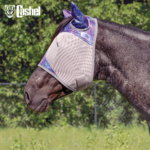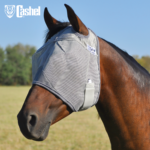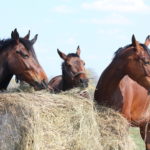Horses have very large eyes with very large pupils. The eyeballs are placed toward the side of the head, giving horses a wider field of vision. In contrast, dogs and coyotes have eyes placed toward the front of their heads, which narrows their total field of vision.

Horses (as well as some other animals such as sheep and cattle) have a much wider visual field than do dogs or coyotes. Horses can scan their entire surroundings with only slight head movement.
The horse uses only one eye–its monocular vision–to observe the width of its visual field. When a horse sees an object with monocular vision, it will tend to turn toward the object to better hear and also, with binocular vision, better see the object. Binocular vision–use of two eyes–results in better depth perception and a more concentrated field of vision. A brief visual shift sometimes occurs as the horse switches from monocular to binocular vision, which can cause an unexplained ?spooking? of the horse.
The size of the pupil improves the ability of a horse to pick up movement. The large size provides the effect of a built-in wide-angle lens, which is further enhanced by the placement of the visual receptors in the retina. The total effect is better peripheral (side) vision. The horse can see movement well. However, it is believed that while the horse sees practically all the way around its body, the image is not as clearly defined as what humans see, especially within 4 feet.
In spite of a wide field of vision, there is a blind spot directly behind a horse. You should avoid approaching a horse from behind because your presence may not be easily detected, and it could startle the horse. Some horses may instinctively kick in this situation. When approaching a horse from the rear cannot be avoided, make a soothing noise to announce your presence. Do not sneak up on a horse from behind.
A question often asked is whether or not horses can see color. It was first thought that both horses and cattle were color blind. If horses can distinguish colors, it is unlikely that their ability to see color is equal to that of other species, such as humans.
From eXtension HorseQuest





